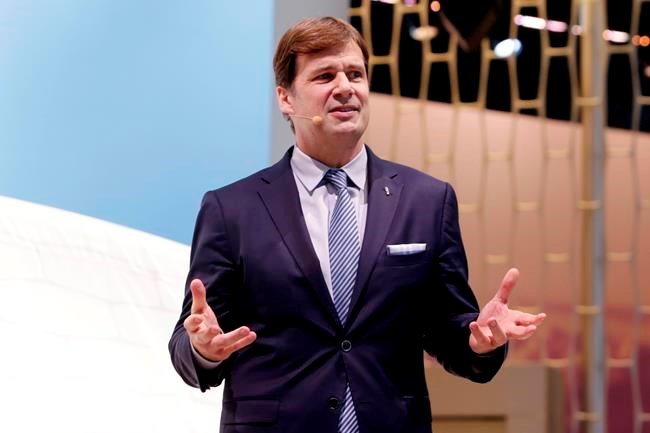DETROIT — On his first day in Ford's top job, CEO Jim Farley is replacing the company's chief financial officer and announcing other structural and management changes.
The company says Thursday that Chief Financial Officer Tim Stone is leaving Oct. 15 to be chief operating officer at an artificial intelligence company. Stone had a short stay at Ford, joining the company from Amazon in April of last year.
He'll be replaced by John Lawler, a 30-year company veteran who has been running autonomous vehicle operations.
During Stone’s tenure, the company has struggled in the midst of an $11 billion restructuring plan designed to cut expenses and raise capital for spending on new technology such as autonomous and electric vehicles. Wall Street analysts raised questions about the pace of the restructuring.
Farley says in the statement that Ford has made progress under retiring CEO Jim Hackett, but he wants to speed up its transformation, which has been in the works for over a year.
The company has plans to grow revenue and hit a sustained 8% pretax profit margin, but Ford gave no time frame to reach that goal.
“We are going to compete like a challenger — allocate capital to higher growth and return opportunities to create value — and earn customers for life through great products and a rewarding ownership experience,” Farley said in a prepared statement.
Ford says it will expand its commercial vehicle business with new software services. It also plans to offer more electric vehicles around the globe including a Transit van and F-150 pickups. There also are plans for an electric Mustang, as well as unspecified SUVs including the Lincoln luxury brand.
Ford also plans to add more affordable electric vehicles to its lineup. Spokesman T.R. Reid said they would be largely for emerging markets, although they could be global. The vehicles are likely to be developed as part of a joint venture with Indian automaker Mahindra.
Farley is retooling the company’s management structure into three regional business units: The Americas and International Markets, Europe, and China. He also plans a new business out of the self-driving system created by Argo AI, a subsidiary in which Ford is the primary investor. Reid said Argo software and autonomous vehicle technology would go to other Ford units, including programs to help businesses with logistics.
Wall Street wasn't overly impressed. Shares of Ford rose 0.6% to $6.70 trading early Thursday.
Reid said Ford is still working on the five-year restructuring plan, which could include further job changes. “That's about making choices again around the business, adding people in some places, becoming more streamlined in other places.”
Earlier this month the company said it would offer early retirement incentives with hopes of cutting its U.S. white-collar workforce by 1,400 more positions. The move was part of the broader restructuring.
Last year the company said it would cut 12,000 jobs in Europe and 7,000 white-collar positions worldwide as it trimmed expenses to prepare for a world of autonomous and electric vehicles. The 7,000 salaried positions amounted to 10% of Ford’s total worldwide and included 2,300 in the U.S. The cuts were accomplished with buyouts and involuntary layoffs.
The cuts were designed to reduce bureaucracy and allow the company to make faster decisions.
Like other automakers, Ford has been struggling this year as the coronavirus forced factory closures and chased customers away from showrooms. Factories that were shuttered have been running for several months and demand has been returning.
From April through June, Ford’s posted better-than-expected results with a $1.12 billion net profit. It was pushed into the black by a $3.5 billion accounting gain on the value of its autonomous vehicle operation. Without that, it would have lost $1.9 billion.
In August Ford named Farley, 58, as its new CEO effective Thursday. Hackett is retiring after three years at the helm. Farley, who has been with Ford for more than a decade, had been chief operating officer since February and clearly was being groomed for the top position.
Tom Krisher, The Associated Press

